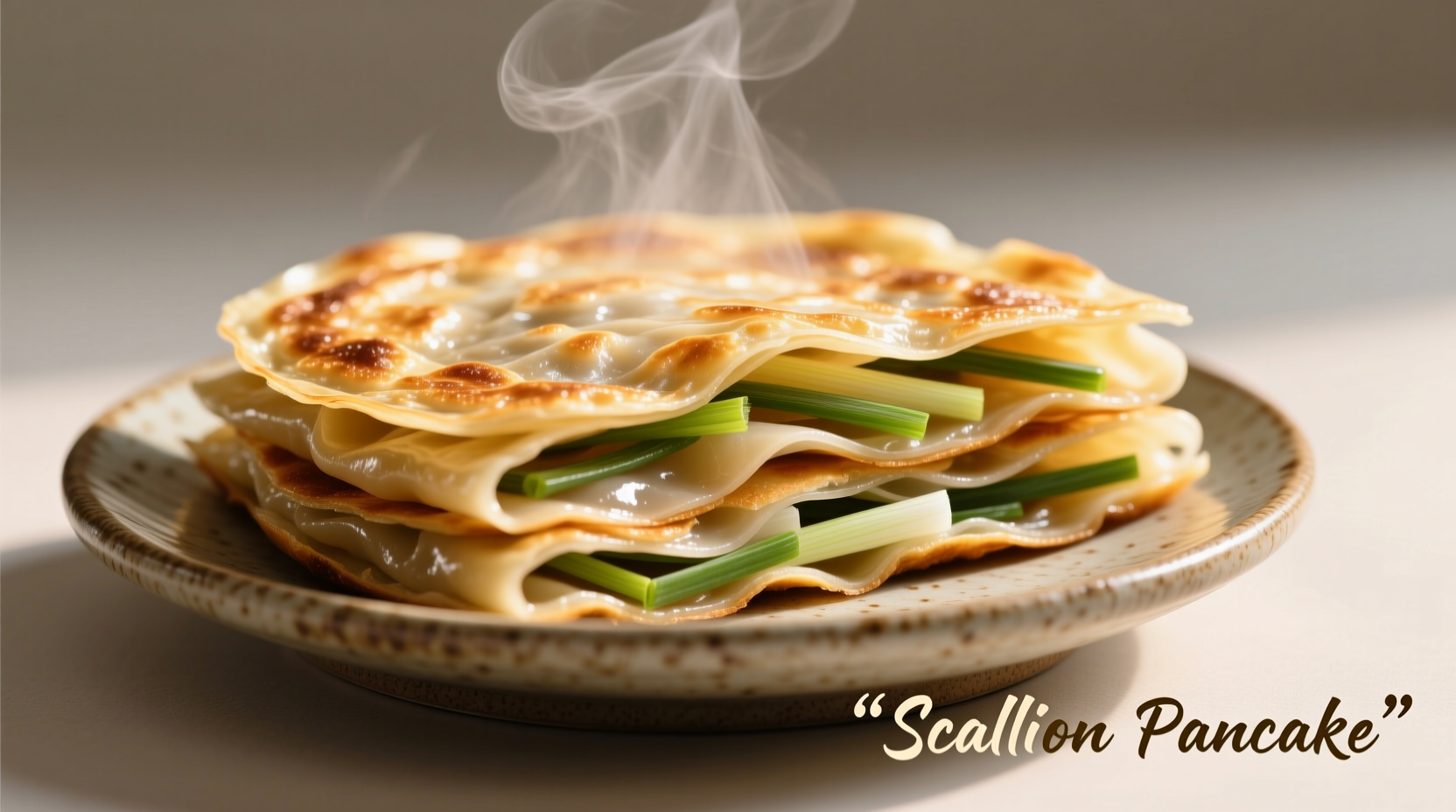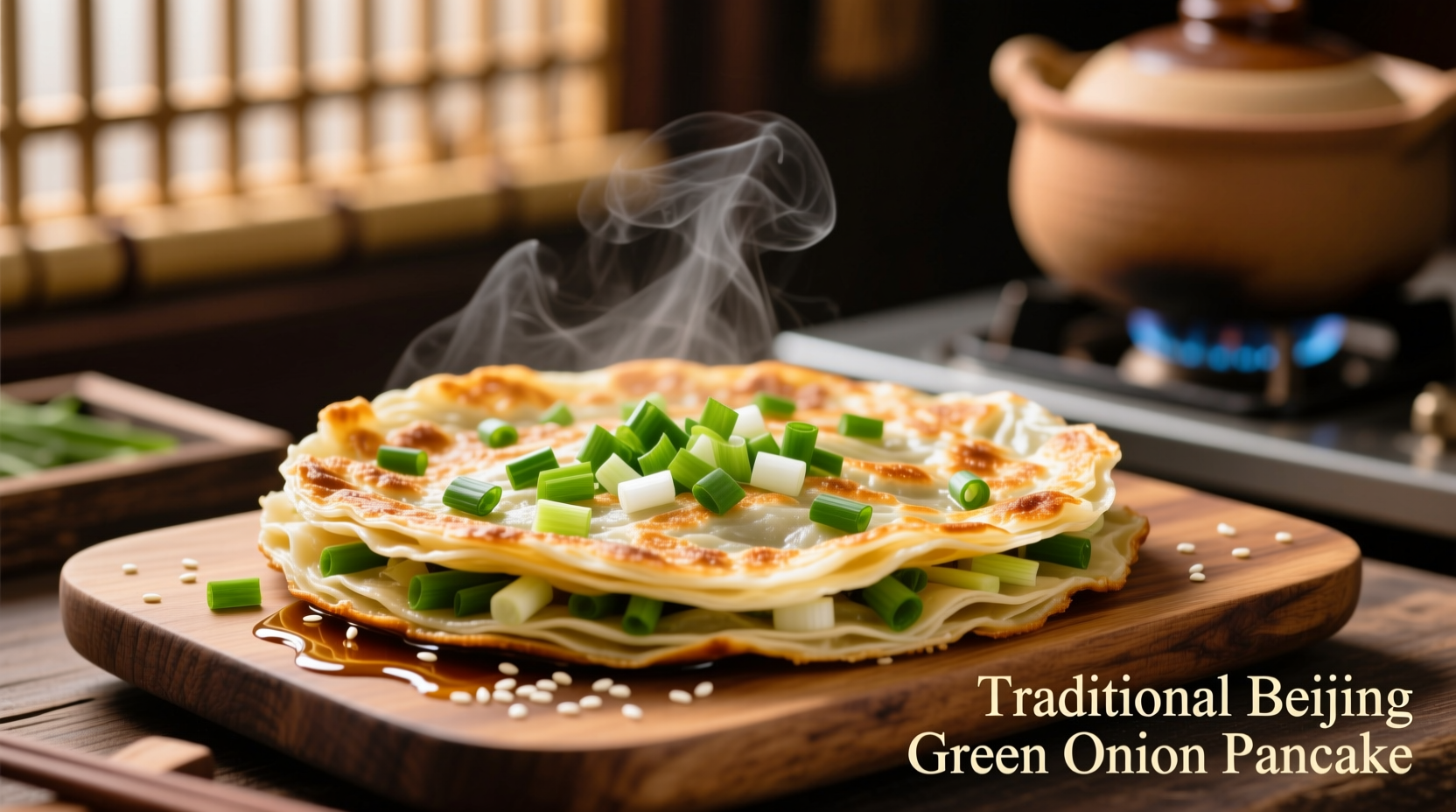Chinese pancake with green onion, also known as cong you bing (葱油饼), is a traditional Chinese flatbread made from wheat flour dough layered with scallions and fried until golden and flaky. Originating from Northern China, this savory snack features a crispy exterior with tender, layered interior and aromatic green onions throughout.
Why This Chinese Classic Deserves a Spot in Your Kitchen
Chinese pancake with green onion isn't just another flatbread—it's a culinary masterpiece that represents centuries of Chinese baking tradition. Unlike Western pancakes, cong you bing features multiple delicate layers created through a specific folding technique, resulting in a texture that's simultaneously crispy and tender. The green onions provide both visual appeal and that distinctive savory aroma that makes this dish irresistible.
The Cultural Journey of Scallion Pancakes
Scallion pancakes trace their origins to Northern China's Shandong province during the Eastern Han Dynasty (25-220 AD). What began as simple unleavened bread evolved through several key historical phases:
| Historical Period | Development | Cultural Significance |
|---|---|---|
| Eastern Han Dynasty | Basic unleavened bread with scallions | Practical food for travelers and soldiers |
| Tang Dynasty (618-907 AD) | Introduction of layered technique | Became popular street food in Chang'an |
| Ming Dynasty (1368-1644) | Regional variations emerged | Different provinces developed unique styles |
| Modern Era | Global popularity through Chinese diaspora | Now enjoyed worldwide as iconic Chinese street food |
This evolution demonstrates how a simple staple transformed into one of China's most beloved street foods. According to culinary historians at the China Culinary Association, scallion pancakes remain among the top five most consumed street foods in mainland China today, with an estimated 20 million consumed daily during peak seasons.
Perfecting Your Homemade Chinese Pancake with Green Onion
Creating authentic cong you bing requires understanding both technique and timing. Here's what separates good from exceptional:
Essential Ingredients Checklist
- All-purpose flour (85%) and bread flour (15%) blend for optimal texture
- Fresh green onions (scallions), thinly sliced
- Hot water (65-70°C) for the dough
- Oil mixture with sesame oil and Chinese five-spice powder
- Sea salt for seasoning
Step-by-Step Preparation Guide
- Dough preparation: Mix 300g flour with 180ml hot water until shaggy, then knead for 8-10 minutes until smooth. Rest covered for 30 minutes.
- Oil mixture: Combine 3 tbsp vegetable oil, 1 tbsp sesame oil, 1 tsp five-spice powder, and 1 tsp salt.
- Layering technique: Roll dough thin, brush with oil mixture, scatter 1 cup sliced scallions, then fold accordion-style before coiling.
- Final rolling: Gently roll coiled dough into 1/4-inch thick circle without pressing out layers.
- Cooking method: Pan-fry in 2 tbsp oil over medium heat for 3-4 minutes per side until golden brown and crisp.
Pro Tips for Flawless Results
- Use hot water for the dough—it creates a more pliable texture that's easier to layer
- Don't skip the resting period; it allows gluten to relax for easier rolling
- Keep heat at medium to prevent burning while ensuring thorough cooking
- Press gently when rolling the final shape to preserve those delicate layers
- Serve immediately for maximum crispness—these don't reheat well

When to Serve Chinese Pancakes: Context Matters
Understanding the proper context for serving Chinese pancakes with green onion enhances your experience. Unlike Western pancakes served primarily for breakfast, cong you bing functions differently in Chinese culinary tradition:
- Traditional context: Served as street food or breakfast item in Northern China
- Meal pairing: Best enjoyed with congee (rice porridge) or as accompaniment to noodle dishes
- Regional variations: In Shanghai, often served with vinegar dipping sauce; in Beijing, commonly eaten plain
- Seasonal considerations: More commonly consumed during cooler months as the hot, oily nature provides warmth
- Limitation: Not typically served as a standalone meal but rather as a complement to other dishes
Troubleshooting Common Issues
Even experienced cooks encounter challenges with Chinese pancakes. Here's how to fix frequent problems:
- Dough too sticky: Lightly dust with flour but avoid adding too much, which can make pancakes tough
- Layers not forming: Ensure you're using enough oil mixture between layers and not pressing too hard when rolling
- Burning before cooking through: Lower heat and consider covering the pan briefly to cook through
- Sogginess after cooking: Drain on wire rack instead of paper towels to maintain crispness
- Green onions burning: Use medium heat and watch carefully during the final cooking stages
Storage and Reheating Guidelines
While Chinese pancakes with green onion are best enjoyed fresh, proper storage can extend their life:
- Store cooled pancakes in airtight container with paper towels to absorb moisture
- Refrigerate for up to 2 days (though quality declines significantly after first day)
- Reheat in dry skillet over medium heat for 2-3 minutes per side
- Avoid microwaving, which creates sogginess
- Freeze uncooked portions for up to 1 month for best results
Authentic vs. Westernized Versions
Many restaurants outside China modify scallion pancakes to suit local tastes. Understanding these differences helps you identify authentic preparations:
| Characteristic | Authentic Chinese Version | Westernized Adaptation |
|---|---|---|
| Dough composition | Hot water dough, no yeast | Often includes yeast or baking powder |
| Layering technique | Multiple delicate layers through folding | Fewer, thicker layers |
| Green onion ratio | Generous amount, visible throughout | Often minimal for milder flavor |
| Cooking method | Pan-fried with minimal oil | Sometimes deep-fried for crispness |
| Texture | Crisp exterior, tender interior | Often uniformly crispy or doughy |
According to research published in the Journal of Ethnic Foods, authentic cong you bing maintains a specific moisture content (35-40%) that creates the perfect balance between crispness and tenderness—a characteristic often lost in Western adaptations.
Final Thoughts for Perfect Chinese Pancakes
Mastering Chinese pancake with green onion requires attention to detail but rewards with an authentic taste of Chinese culinary tradition. The key lies in understanding the balance between technique and ingredients—particularly the hot water dough and precise layering method. When executed properly, these pancakes offer a sensory experience that combines visual appeal, aromatic scallion fragrance, and that signature layered texture that makes cong you bing so special.











 浙公网安备
33010002000092号
浙公网安备
33010002000092号 浙B2-20120091-4
浙B2-20120091-4